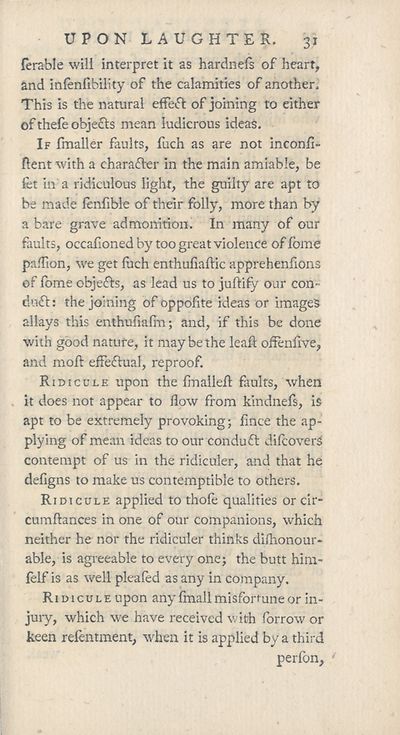Download files
Complete book:
Individual page:
Thumbnail gallery: Grid view | List view

UPON LAUGHTER. 31
ferable will interpret it as hardnefs of heart,
and inlenfibility of the calamities of another.
This is the natural efTetH: of joining to either
of thefe objetts mean ludicrous ideas.
If fmaller faults, fuch as are not inconfi-
ftent with a character in the main amiable, be
fet in' a ridiculous light, the guilty are apt to
be made fenfible of their folly, more than by
a bare grave admonition. In many of our
faults, occafioned by too great violence of lome
paffion, we get luch enthufiaftic apprehenfions
of fome objefts, as lead us to juftify our con¬
duct: the joining of oppofite ideas or images
allays this enthufmfm; and, if this be done
with good nature, it may be the leaft offenfive,
and molt effeftual, reproof.
Ridicule upon the Imalleft faults, when
it does not appear to flow from kindnels, is
apt to be extremely provoking; fince the ap¬
plying of mean ideas to our conduft difcoverS
contempt of us in the ridiculer, and that he
defigns to make us contemptible to others.
Ridicule applied to thole qualities or cir-
cumftances in one of our companions, which
neither he nor the ridiculer thinks dilhonour-
able, is agreeable to every one; the butt him-
felf is as well pleafed as any in company.
Ridicule upon any Imall misfortune or in¬
jury, which we have received with forrow or
keen relentment, when it is applied by a third
perfon, '
ferable will interpret it as hardnefs of heart,
and inlenfibility of the calamities of another.
This is the natural efTetH: of joining to either
of thefe objetts mean ludicrous ideas.
If fmaller faults, fuch as are not inconfi-
ftent with a character in the main amiable, be
fet in' a ridiculous light, the guilty are apt to
be made fenfible of their folly, more than by
a bare grave admonition. In many of our
faults, occafioned by too great violence of lome
paffion, we get luch enthufiaftic apprehenfions
of fome objefts, as lead us to juftify our con¬
duct: the joining of oppofite ideas or images
allays this enthufmfm; and, if this be done
with good nature, it may be the leaft offenfive,
and molt effeftual, reproof.
Ridicule upon the Imalleft faults, when
it does not appear to flow from kindnels, is
apt to be extremely provoking; fince the ap¬
plying of mean ideas to our conduft difcoverS
contempt of us in the ridiculer, and that he
defigns to make us contemptible to others.
Ridicule applied to thole qualities or cir-
cumftances in one of our companions, which
neither he nor the ridiculer thinks dilhonour-
able, is agreeable to every one; the butt him-
felf is as well pleafed as any in company.
Ridicule upon any Imall misfortune or in¬
jury, which we have received with forrow or
keen relentment, when it is applied by a third
perfon, '
Set display mode to:
![]() Universal Viewer |
Universal Viewer | ![]() Mirador |
Large image | Transcription
Mirador |
Large image | Transcription
| Antiquarian books of Scotland > Curiosities & wonders > Reflections upon laughter > (39) |
|---|
| Permanent URL | https://digital.nls.uk/119117960 |
|---|
| Description | Thousands of printed books from the Antiquarian Books of Scotland collection which dates from 1641 to the 1980s. The collection consists of 14,800 books which were published in Scotland or have a Scottish connection, e.g. through the author, printer or owner. Subjects covered include sport, education, diseases, adventure, occupations, Jacobites, politics and religion. Among the 29 languages represented are English, Gaelic, Italian, French, Russian and Swedish. |
|---|

